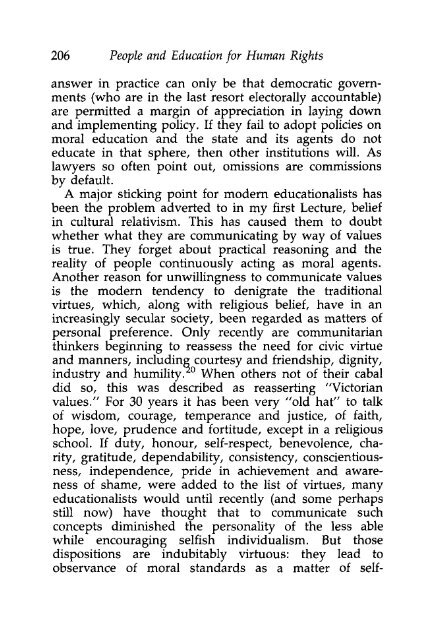The United Kingdom and Human Rights - College of Social ...
The United Kingdom and Human Rights - College of Social ...
The United Kingdom and Human Rights - College of Social ...
Create successful ePaper yourself
Turn your PDF publications into a flip-book with our unique Google optimized e-Paper software.
206 People <strong>and</strong> Education for <strong>Human</strong> <strong>Rights</strong><br />
answer in practice can only be that democratic governments<br />
(who are in the last resort electorally accountable)<br />
are permitted a margin <strong>of</strong> appreciation in laying down<br />
<strong>and</strong> implementing policy. If they fail to adopt policies on<br />
moral education <strong>and</strong> the state <strong>and</strong> its agents do not<br />
educate in that sphere, then other institutions will. As<br />
lawyers so <strong>of</strong>ten point out, omissions are commissions<br />
by default.<br />
A major sticking point for modern educationalists has<br />
been the problem adverted to in my first Lecture, belief<br />
in cultural relativism. This has caused them to doubt<br />
whether what they are communicating by way <strong>of</strong> values<br />
is true. <strong>The</strong>y forget about practical reasoning <strong>and</strong> the<br />
reality <strong>of</strong> people continuously acting as moral agents.<br />
Another reason for unwillingness to communicate values<br />
is the modern tendency to denigrate the traditional<br />
virtues, which, along with religious belief, have in an<br />
increasingly secular society, been regarded as matters <strong>of</strong><br />
personal preference. Only recently are communitarian<br />
thinkers beginning to reassess the need for civic virtue<br />
<strong>and</strong> manners, including courtesy <strong>and</strong> friendship, dignity,<br />
industry <strong>and</strong> humility. When others not <strong>of</strong> their cabal<br />
did so, this was described as reasserting "Victorian<br />
values." For 30 years it has been very "old hat" to talk<br />
<strong>of</strong> wisdom, courage, temperance <strong>and</strong> justice, <strong>of</strong> faith,<br />
hope, love, prudence <strong>and</strong> fortitude, except in a religious<br />
school. If duty, honour, self-respect, benevolence, charity,<br />
gratitude, dependability, consistency, conscientiousness,<br />
independence, pride in achievement <strong>and</strong> awareness<br />
<strong>of</strong> shame, were added to the list <strong>of</strong> virtues, many<br />
educationalists would until recently (<strong>and</strong> some perhaps<br />
still now) have thought that to communicate such<br />
concepts diminished the personality <strong>of</strong> the less able<br />
while encouraging selfish individualism. But those<br />
dispositions are indubitably virtuous: they lead to<br />
observance <strong>of</strong> moral st<strong>and</strong>ards as a matter <strong>of</strong> self-

















